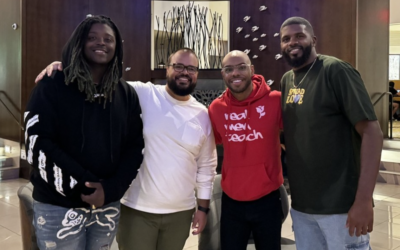DREAM’s unique Grow the Whole Child education model is powered by four interconnected elements that drive transformative change for youth: rigorous academics; social-emotional learning; a deep commitment to family and community engagement; and a belief in the foundational importance of physical and mental health and wellness.
With DREAM’s roots as a youth-serving nonprofit organization, that commitment to family and community engagement has been a pillar of our work for more than 30 years. Today, we continue to strengthen that partnership through DREAM Family Action Councils (DFAC), a unified, informed team of DREAM families and staff who work together to support our mission and commitment to student learning.
“It is important for schools and school networks to facilitate strong partnerships with parents and families, because it helps build a sense of community among parents, teachers, and students,” says Crystal Sanchez, President of DREAM East Harlem Middle School’s DFAC, whose children attend both the middle school and DREAM Charter High School. “Families often have greater insight into the child’s life at home, which allows them to adapt classroom learning to best help the scholar.”
DREAM’s DFAC roster currently consists of five full councils in East Harlem and Mott Haven, with another launching soon for DREAM Highbridge families. These DFACs work to develop an active and involved family body at each school, and serve as a means of communication between families, faculty, and administration—linking school and community. What’s more, DREAM Family Action Councils travel annually to Albany in a contingent of DREAM families to join peer networks and elected officials in celebrating charter education’s impact on student success and calling for continued government support.
“As a DREAM parent, it’s important to be involved in DFAC, because it gives us an opportunity to be part of a powerful association to advocate on behalf of our children and advocate for families’ interests and concerns at the school and district level.”
Crystal Sanchez, DREAM East Harlem Middle School DFAC President
Through volunteering, fundraising, participating in events, and providing input on decision-making processes, DFAC members promote a sense of belonging among DREAM families and champion our maxim “DREAM is family.”
“As a DREAM parent, it’s important to be involved in DFAC, because it gives us an opportunity to be part of a powerful association to advocate on behalf of our children and advocate for families’ interests and concerns at the school and district level,” says Sanchez.
Earlier this year, all of DREAM’s DFAC members came together at the DREAM Charter School at 20 Bruckner to launch the new year, align on goals, and share their experiences as DFAC members and DREAM parents. It was the first full gathering of DREAM DFACs since the start of the COVID-19 pandemic, and the largest gathering of DFAC members since the first DREAM Charter School opened its doors in 2008.
“Families are our deepest connection to our communities,” said DREAM co-Chief Executive Officer Eve Colavito at the January breakfast. “The biggest part of making DREAM more than a school is all of you.”
You can learn more about DREAM Family Action Councils by reading our DFAC brochure at the link.






0 Comments